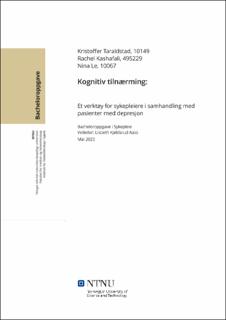| dc.contributor.advisor | Aass, Lisbeth Kjeldsrud | |
| dc.contributor.author | Taraldstad, Kristoffer | |
| dc.contributor.author | Kashafali, Rachel | |
| dc.contributor.author | Le, Nina | |
| dc.date.accessioned | 2022-09-02T17:20:27Z | |
| dc.date.available | 2022-09-02T17:20:27Z | |
| dc.date.issued | 2022 | |
| dc.identifier | no.ntnu:inspera:106262086:112059481 | |
| dc.identifier.uri | https://hdl.handle.net/11250/3015511 | |
| dc.description.abstract | Bakgrunn: Depresjon er en relativ vanlig lidelse i Norge, som i følge Folkehelseinstituttet vil ramme rundt 20% av befolkningen gjennom livet, og 10% av befolkningen i løpet av ett år. Dette vil si at sykepleiere har stor sannsynlighet til å møte mennesker med depresjon i sitt arbeid, uten å ha videre kunnskap innen en standardisert strukturert metode å samhandle med disse etter sin utdanning.
Hensikt: Hensikten med denne oppgaven er å se hvordan kognitiv tilnærming vil hjelpe sykepleiere i samhandling med pasienter med depresjon. Oppgavens hensikt vil også være å se hvordan sykepleiere kan bruke kognitiv tilnærming, og hvilke elementer fra kognitiv terapi som vil være mest relevant for sykepleiere.
Metode: For å besvare problemstillingen i denne oppgaven, vil litteraturstudie anvendes som metode. Her vil vi benytte relevante søkeord, og kombinere dem i databasene Medline, Cinahl og PubMed.
Resultat: Dette kapitlet består av resultater fra de fem vitenskapelige artiklene vi har valgt til oppgaven. Kognitiv tilnærming har sine fundamentale prinsipper fra kognitiv terapi, og vil hjelpe sykepleiere til å bedre kartlegge, kommunisere og samhandle med pasienter med depresjon. Aktiv brukerstyrte samtaler og sokratisk spørremetode er noen av elementene som blir dratt frem i forbindelse med dette.
Konklusjon: Kunnskap om kognitiv tilnærming er et verdifullt vertktøy for sykepleiere å inneha, ikke bare innen psykiatritjenesten. Sykepleiere i alle deler av helsevesenet vil kunne ha nytte av å inneha kunnskap om kognitiv tilnærming, for å bedre kunne imøtekomme og samhandle med mennesker med depresjon. | |
| dc.description.abstract | Background: Depression is a relatively common disorder in Noway, and will according to the Norwegian Institute of Public Health affect about 20% of the population during through life, and 10% of the population each year. This means that nurses will have a high probability of meeting people with depression in their work, without having too much knowledge of a standardized structured method of interact with these people after their education.
Purpose: The purpose of this article is to examine how cognitive approach will help nurses in interacting with patients with depression. Furthermore, to examine how nurses can utilize cognitive approach, and wich elements from cognitive therapy that will be of most relevance to nurses.
Method: To answer the issue in this article, will literature study be applied as method. We will make use of relevant keywords, and combine them in the databases Medline, Cinahl and PubMed.
Results: This chapter will consist of results from the five scientific articles we’ve chosen for this article. Cognitive approach has its fundamental principals from cognitive therapy, and will help nurses to better map, communicate and interact with patients with depression. Active patient-controlled conversations, and socratic questioning is some of the elements that’s drawn forward in relation to this.
Conclusion: Knowledge of cognitive approach is a useful tool for nurses to possess, not just within the field of psychiatry. Nurses in all parts of the health service will have good use of knowledge about cognitive approach, to better accommodate and interact with people with depression. | |
| dc.language | nob | |
| dc.publisher | NTNU | |
| dc.title | Kognitiv tilnærming: Et verktøy for sykepleiere i samhandling med pasienter med depresjon | |
| dc.type | Bachelor thesis | |
